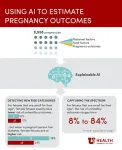‘Sleep hygiene’: How FIFO workers can get a better night's sleep
2025-01-30
(Press-News.org)
‘Sleep hygiene’: How FIFO workers can get a better night's sleep
Better sleep hygiene could see fly-in, fly-out (FIFO) mining shift workers get a better night’s sleep, new research from Edith Cowan University (ECU) has shown.
Sleep hygiene includes habits and sleep environment factors that can positively influence sleep, including a healthy diet, physical exercise and limited screen time. While these all seem obvious, the remote location of mine sites across Australia and the nature of mining, often makes it difficult for employees on mine sites to get adequate shut-eye.
ECU PhD candidate Mr Philipp Beranek noted that employees undertaking shift work often had the most difficulty in achieving and maintaining good sleep quality and sufficient sleep duration.
Previous research has shown that average sleep durations of 6 hours to 6 hours and 19 minutes for FIFO workers on day shifts, 5 hours and 32 minutes to 6 hours and 12 minutes for those working night shifts, and 6 hours and 49 minutes to 7 hours and 18 minutes on days off.
“Shift workers often experience sleep disruptions because they are unable to allocate a constant and specific time for sleeping, and their body clock is often not adjusted for this. If you are working the night shift, it requires you to go to bed at a time when your brain and body usually are awake and set to function,” Mr Beranek said.
“FIFO workers have long shifts, yet they are still required to do all the normal things as well, like having dinner, washing their clothes, doing exercise or even commute from the mine site. It makes it difficult to manage sufficient sleep within that 24-hour period.”
Mr Beranek notes that his research found FIFO workers with better sleep hygiene had better health.
“Specifically, we found better sleep health in FIFO workers that have a better sleep environment, more regular sleep schedule, and better mental health.”
“Having an optimal sleep environment can be difficult in remote mining camps. For instance, in the Pilbara region in WA it gets really hot during summer. This can lead to elevated room temperatures, which potentially disrupt the sleep of night shift workers who sleep during daytime.”
Improving sleep hygiene onsite:
Set air-conditioning between 16 and 20°C
Purchase a more comfortable pillow
Stick to a consistent bedtime and wakeup time
Practice mindfulness or meditation
V “Having a regular sleep schedule came up as a significant aspect of sleep hygiene for FIFO workers. It is nearly impossible for shift workers to have consistent sleep schedules when you are on rotating shifts, but workers should aim to have a regular sleep schedule when they are on day shift, a regular sleep schedule for when they are on night shift, and a regular sleep schedule for when they have time off at home,” Mr Beranek added.
- ends -
Media contact: Esmarie Iannucci, 08 6304 3080 or 0405 774 465
e.iannucci@ecu.edu.au
Journalists can subscribe to get the latest research news delivered to your inbox.
END
ELSE PRESS RELEASES FROM THIS DATE:
2025-01-30
###EMBARGOED BY BMC PREGNANCY AND CHILDBIRTH UNTIL 1AM GMT JAN 30 / 8PM ET JAN 29###
A new AI-based analysis of almost 10,000 pregnancies has discovered previously unidentified combinations of risk factors linked to serious negative pregnancy outcomes, including stillbirth.
The study also found that there may be up to a tenfold difference in risk for infants who are currently treated identically under clinical guidelines.
Nathan Blue, MD, the senior author on the study, says that the AI model the researchers generated helped identify a “really unexpected” combination of factors associated with higher risk, and that the model is an important step ...
2025-01-30
A new Cochrane review confirms that antidepressants effectively reduce symptoms of generalized anxiety disorder (GAD) under trial conditions, although there is limited data on long-term usage.
GAD affects millions of people worldwide and is characterized by excessive worry about everyday issues. Antidepressants, particularly selective serotonin reuptake inhibitors (SSRIs) and serotonin-norepinephrine reuptake inhibitors (SNRIs), are recognized treatments for GAD, recommended by many national bodies including the UK’s National Institute for Health and Care Excellence. However, misconceptions ...
2025-01-30
Childhood trauma can include witnessing death, experiencing severe injury, and physical or sexual violence.
Over 81% of Brazilian youth had experienced trauma by age 18.
Trauma was potentially responsible for a third of all mental health disorders by age 18.
A new study by a team of researchers from the UK and Brazil has revealed a strong connection between childhood trauma and the development of psychiatric disorders in adolescents living in low-and middle-income countries.
The research findings are based on the 2004 Pelotas Birth Cohort, Brazil, which has tracked more than 4,000 children born in Pelotas, a city in the southern ...
2025-01-30
An England-wide study of over 58 million people has identified eight rare diseases that carry significantly increased risks for COVID-19-related mortality in fully vaccinated individuals. This important research calls for better inclusion of rare diseases in public health strategies, including future pandemic planning, vaccination policies, and NHS service provision.
Historically rare diseases have been difficult to study and neglected in research, in part due to a lack of large-scale data. This means that people living with rare conditions often struggle to get the treatment and support they need. Additionally, rare disease patients were overlooked in public health ...
2025-01-30
Fresh embryo transfer may be a better option than use of frozen embryos for women with a low chance of having a healthy baby by vitro fertilisation (IVF), suggests a trial from China published by The BMJ today.
The researchers say their findings do not support the routine use of the freeze-all strategy in women with low prognosis of IVF treatment success, which can be due to older age, low quantity or quality of eggs, or certain underlying conditions.
IVF has revolutionised infertility treatment and a strategy of freezing all suitable embryos before transfer (freeze-all strategy) is now a routine part of the treatment to help prevent ...
2025-01-30
Dongqing Wang, an assistant professor of Global and Community Health at George Mason’s College of Public Health, is pioneering research in prenatal nutritional interventions. His latest report identifies prenatal supplements that reduce health risks to small and vulnerable babies. This research was published in the prestigious The Lancet Global Health journal and funded by the Bill and Melinda Gates Foundation.
Wang found that compared to folic acid and iron alone, a multiple micronutrient supplement ...
2025-01-30
-With images-
Researchers at Durham University have achieved a major advancement in understanding how proteins bind metals inside cells, a process crucial to life.
The study, published in Nature Communications, introduces a pioneering approach that allows scientists to accurately predict and engineer the metalation of proteins, a discovery with far-reaching implications for biotechnology and sustainable biomanufacturing.
The research builds upon years of work by the research team, dating back to key discoveries published in 2008.
In ...
2025-01-29
Encouraging bilingualism at home can have many cognitive benefits, which may be particularly helpful to kids with autism spectrum disorder (ASD), new research from the University of Miami College of Arts and Sciences indicates.
A team of researchers led by Celia Romero, a graduate student in clinical psychology, along with associate professor Lynn Perry, professor Michael Alessandri, and former University professor Lucina Uddin, explored the role of bilingualism in 112 children, including typically developing children and children with autism, between the ages of 7 to 12 years old. Overall, they found that children who spoke two or more languages often had stronger executive ...
2025-01-29
Systemic lupus erythematosus, more commonly known as lupus, has a variety of symptoms and room for improvement when it comes to treatment.
Cutaneous lupus erythematosus is a common manifestation of systemic lupus erythematosus.
The condition is characterized by rashes on various parts of the body including the face and scalp, hair loss and scarring of the skin.
The rashes are caused by inflammation from the immune system fighting the body.
The standard treatment for cutaneous lupus erythematosus is using immunosuppressants and biologic drugs to reduce inflammation.
While ...
2025-01-29
Scientists at the National Institute of Standards and Technology (NIST) have created a new thermometer using atoms boosted to such high energy levels that they are a thousand times larger than normal. By monitoring how these giant “Rydberg” atoms interact with heat in their environment, researchers can measure temperature with remarkable accuracy. The thermometer’s sensitivity could improve temperature measurements in fields ranging from quantum research to industrial manufacturing.
Unlike traditional thermometers, a Rydberg thermometer doesn’t need to be first adjusted or calibrated at the ...
LAST 30 PRESS RELEASES:
[Press-News.org] ‘Sleep hygiene’: How FIFO workers can get a better night's sleep

